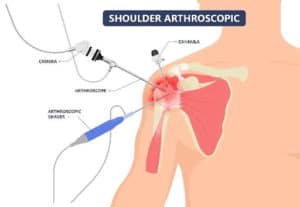Labral Tear Repair Treatment in Chillicothe, OH
Dr. Brian Cohen treats labrum tears that cause painful symptoms and limited range of motion.
What is a Labrum Tear?
Your shoulder is a ball-and-socket joint with a wide range of motion. Your upper arm bone has a top shaped like a ball. This ball fits into a socket in your shoulder blade. The socket is your glenoid. Surrounding the socket is soft, fibrous tissue or gasket, called the labrum.
The labrum helps with shoulder joint stabilization. It is also where many of the shoulder ligaments attach and is where the long head of the biceps tendon attaches. Ligaments are fibrous bands of tissue that connect bone to other bone. Tendons are fibrous bands of tissue that connect muscle to bone.
A labrum tear is an injury to the labrum of the shoulder. There are different types of labrum tears that can occur in different locations of the labrum and impact other parts of the arm and shoulder. A labral tear can be the result of a traumatic injury or can be degenerative in nature.

Labrum Tear Symptoms
Labrum tear symptoms vary by the type of tear and can include the following:
- Shoulder pain
- Pain with overhead activities
- Decreased range of motion
- A feeling that the shoulder is unstable
- Clicking and/or catching of the shoulder
- Weakness
Labrum Tear Diagnosis
If you have a persistent shoulder injury, and are concerned you have a labral tear, Dr. Cohen or one of his sports medicine colleagues will inquire about the nature of your injury and related symptoms. The doctor will perform a focused, comprehensive physical exam to evaluate your shoulder for areas of tenderness, assess range of motion and establish if you have normal or decreased arm strength. Depending on the findings, they may order an X-ray and/or an MRI.
The best method to diagnose a labrum tear outside of the operating room is an MRI arthrogram. This is a special MRI, where the radiologist will inject a contrast material into the shoulder joint to help visualize the shoulder anatomy.
Sometimes, the MRI and/or the MRI arthrogram may miss enhancing the labral tear. Arthroscopic surgery is the most accurate to diagnosis a labral tear. During arthroscopic surgery, several small incisions are made in the shoulder area. The orthopedic surgeon then uses an arthroscope, a device about the size of a pencil that carries a tiny video camera, to look inside the shoulder for labrum tears and other shoulder pathologies.
Why Choose Dr. Cohen?
OVER 20 YEARS EXPERIENCE
One of the first orthopedic surgeons employed by a large hospital. Dr. Cohen spent 20 years.
TRUSTED BY OVER 100,000+ PATIENTS WORLDWIDE
Over his distinguished career, Dr. Cohen has cultivated a reputation of excellence and trust among his patients and his peers.
UTILIZING THE LATEST TECHNOLOGY
To achieve the best surgical outcomes, Dr. Cohen utilizes the most advanced technologies and techniques, keeping his practice state of the art.
PATIENT SAFETY IS TOP PRIORITY
An individualized, patient-focused process coupled with decades of training and experience help ensure maximum safety for all of Dr. Cohen’s patients.
Labrum Tear Treatment Options
The treatment for a labral tear is patient-dependent and will be tailored to your specific needs.
Nonsurgical Treatment
Some labrum tears may be treated without surgery with the following:
- Rest
- Anti-inflammatory medication
- Physical therapy
Surgical Treatment
In many instances, surgery may be necessary. Arthroscopic surgery is the most common type of surgery used for labrum tears.
 Arthroscopic surgery is a noninvasive surgery that uses tiny surgical tools inserted through small incisions around the shoulder area. The orthopedic surgeon uses the arthroscope to look inside the shoulder to perform the procedure. Dr. Cohen will determine the best treatment option for you. This will take into account your health, lifestyle and the severity of the tear.
Arthroscopic surgery is a noninvasive surgery that uses tiny surgical tools inserted through small incisions around the shoulder area. The orthopedic surgeon uses the arthroscope to look inside the shoulder to perform the procedure. Dr. Cohen will determine the best treatment option for you. This will take into account your health, lifestyle and the severity of the tear.
Your labrum tear surgical treatment may involve:
- Trimming the labrum
- Repairing the labrum
In situations where the tear extends into or compromises the attachment of the long head of the biceps tendon, the biceps tendon may need to be released at the same time the labral tear is repaired. This can also be done in conjunction with the re-attachment of the biceps tendon to the upper arm bone through a small open incision.
Schedule Your Consultation
If you are suffering from a labrum tear, schedule a personal consultation with Columbus, Ohio orthopedic surgeon Dr. Brian Cohen by calling or emailing his office today. Dr. Cohen has extensive labrum tear treatment experience and can help you learn more about your labrum tear treatment options.






